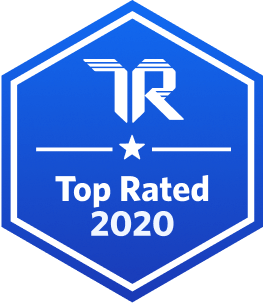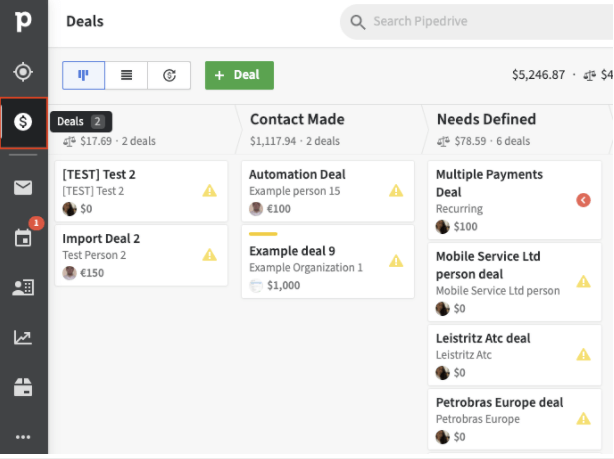4 Best CRM Software for Small Businesses and Who Should Use Each
In purchasing customer relationship management (CRM), balancing features and cost for your use case will be the key to the right purchase. The end goal is ultimately improving your interactions with customers, increasing sales, and reducing workload. The purpose of this piece is to discuss the best tools for some of the most common use cases. From here, we look at the features included in that software at the recommended price point, in order to help you determine what is right for you. The four products we will be looking at are:
As a small business, this means exploring the needs relevant to you. These cases explore:
- Price
- Integrations
- Mobile support
- Sales
- Marketing
- Tech skills required
| HubSpot CRM | Pipedrive | Zoho CRM | Salesforce | |
| Price | Free | 12.50/User/Mo. | 12.50/User/Mo. | 25-75/user/Mo. |
| Tech Skill Required | Minimal | Minimal | Moderate | Advanced |
| trScore | 8.3/10 | 8.2/10 | 7.9/10 | 8.4/10 |
| Biggest Pro | Low Cost, Comprehensive Option | Perfect for Sales Teams | Great Integration With Zoho Products | Huge Depth of Features |
| Biggest Con | Limited Features | Limited Beyond its Niche | Purely a CRM, Other Features in Other Zoho Products | Training Required to Take Full Advantage |
 | ✓ | ✓ | ✓ | ✓ |
Which CRM is Right for You?
In determining which is the best CRM for your business, think of your use case, and the phrase that best describes you and your needs.
You Want a Free Option with Email Marketing but Limited CRM, or Affordable Customer Service
HubSpot: HubSpot free offers a host of features in its free software options. It is listed in our best free marketing automation post for a reason. HubSpot’s free email marketing features are fantastic, offering up to 500 emails a day while allowing you to store up to 1,000,000 contacts.
HubSpot divides its software into the Free Tools, Marketing, Sales, and Customer Service categories. If this sounds familiar, those are the capabilities people tend to look for in CRM software.
The first of the categories is Free Tools. You might have guessed that many of the Marketing, Sales, and Customer Service Features are not included in the free versions. Each of the paid modules can be bought individually for 45 dollars a month. This is a pricey option compared to some of the other choices below. That is why we recommend HubSpot if the free features fit your needs.
For Sales, HubSpot includes free live chat and conversational bots. The software also features the ability to create quotes, scheduling emails, calling, and a handy reporting dashboard.
In Customer Service, users can create support tickets, the backbone of customer service. The live chat will be useful, as well as reports on how long customers are kept waiting, and integration with Facebook Messenger. Many of these use AI to reduce your workload while driving customer engagement and issue-resolution.
As a result of this, if you are looking for customer service tools, HubSpot is probably the best option for you. The ability to directly pay for this section means you can get a wealth of features in this area for a good price.
In Marketing, the aforementioned email marketing is strong, but HubSpot also offers basic ad management and mobile optimization for your content—though both of these are pretty limited. The email management and automation are fantastic.
HubSpot CRM includes contact management, a “Prospects” tool to see which companies are visiting your site. From here, you can track ongoing deals and opportunities. The user interface is pretty straightforward. With contact photos, close dates, and pricing right in the deals dashboard, the simple CRM features are well suited to small businesses.

HubSpot CRM is also praised for strong organization tools, with the ability to assign team members tasks, and set reminders if they don’t get to them on time. Integration with Google Calendar and Outlook Calendar are great bonuses as well.
Bottom Line and Use Cases: HubSpot is the right choice for you if you are looking for a free tool with strong email marketing, and a limited CRM tool. This is great for a company with a lot of newsletters, and a small sales team you wanted to keep track of. It would be less suitable if you need complex analytics tools and more detailed lead management.
This is the best customer service option on our list, promising to improve customer interactions in that area for a good price. Salesforce does offer customer service tools but at a much higher price. Unlike some of the other options on our site, you don’t need extensive tech experience to use HubSpot for support workflows.
A reviewer summarized the combination of features relative to the competition well:
“For a small to mid-sized company with limited business development and marketing resources, Hubspot is an excellent alternative to Pipedrive (lower-end but cheaper) and Salesforce (higher customizability, but requiring dedicated resources and management). Once you’ve spent time with the tool and learned its quirks, regular updating and management is a breeze.”
Ryan Roch, CSM |Business Development Manager |SelfInternet, 11-50 employees
You Have a Small Sales Team and a Tight Budget
Pipedrive: In terms of affordability, CRM does not come much cheaper than Pipedrive. With the entry-level of just $12.50 per month, even the tightest budgets can justify this tool for their sales team.
Our small business reviewers praise Pipedrive for its ease of use and great interface. They like the integration potential, including cooperation tools like Slack, Google apps, and even other CRM tools. Ultimately, this is a sales tool at heart and Pipedrive markets itself accordingly. If you are looking for customer relationship management software mainly for managing sales processes, this is for you.
This software has a host of tools for a sales team to make use of. Pipedrive offers wonderful deal management, customizable pipelines, custom fields, data importing, and exporting. Their notification for when a deal stays unopened for too long is dubbed “rotting,” a creative and visual way of handling this problem.
The deals tab includes adding contact value, win probability, and close dates. It will track them from start to finish, and that color-coded “rotting” system lets your team stay on top of what others may let fall through the cracks.

For a sales team, pipelines can be assigned to small taskforces, individual reps, or the whole group. The sales insights are fantastic, with great visuals, and easy-to-use. Reviewers also note a great mobile app. Pipedrive supports both iOS and Android.
Bottom Line and Use Cases: If you are looking to boost sales through your CRM, and it will be mainly used by your sales reps, Pipedrive is the CRM for you. At a great price point, this is a cost-effective solution to many sales needs. This is for SMBs that do not have the time or money to have a staff member who is trained in CRM software as a major aspect of their job, and little else. This is not for the user with more advanced analytics skills.
I Can Use Zoho to Manage Multiple Parts of My Business, and/or I Want a Strictly CRM Tool
Zoho CRM: If you already use Zoho, you are certainly familiar with the array of software this vendor offers. Their CRM integrates perfectly with their other tools. This includes email marketing, analytics, accounting, workplace management, and more. You can use Zoho CRM as a base to build off with other tools.
For $12/user/mo, you get access to lead and contact management as well as forecasting and workflow rules. The detailed and customizable sales pipelines are easy-to-use and very design-focused, allowing for great visualization. With a colorful, intuitive UI, Zoho CRM this software will require some, but not extensive training for its users

The email marketing features of other CRM are in Zoho Campaigns, a linked software. The more complex data analysis and visualization are in Zoho Analytics. There is even accounting software, in Zoho Books. You can see where this is going.
Zoho allows you to buy what you need for your company when you need it. If you are looking for sales automation, lead and deal management, and other fundamental CRM features, this is a great choice for you. If you are already using Zoho for email marketing, that makes this choice easier—knowing how well they will integrate.
Zoho also integrates with a huge number of software outside of the Zoho ecosystem, including Google tools and Microsoft. This will also work with survey tools, Quickbooks, and other resource management software.
Zoho offers full mobile support, like the others listed here. That colorful nature and easy visualization works well on iOS and Android, making it easy to use on the go.
Zoho does offer Bigin, a CRM solution designed specifically for smaller businesses. This tool has a focus on ease of use and simplicity and lends itself well to those with limited experience. This service does not have the same popularity as Zoho CRM, and is not a Top Rated award winner on TrustRadius. If you don’t mind the lower popularity, and want something purpose-built for a small business, this is worth exploring.
This is probably the purest CRM tool here. You get exactly that, with the ability to integrate with other tools for other functions. One user describes its functionality well, saying:
“We have used Zoho to manage the sales and marketing process. It is used by both the sales and marketing teams to monitor and track sales leads and opportunities, and we have used Zoho Campaigns for email marketing. Because of its integration with the Zoho suite of business tools, Zoho can address most all of the requirements of our sales and marketing teams.”
Ron Sherwood, Senior Account Manager | Novus Media Today Group, LLCOnline Media, 11-50 employees
Bottom Line and Use Cases: If you strictly need a CRM solution, Zoho CRM is the option for you. This is better than Pipedrive for Zoho shops, as well as those who will have the billing team working with it as much as sales. If you are looking to scale-up in the near future, or use other Zoho products to manage your business, this is for you. Simpler than Salesforce, Zoho CRM would not at all require a full-time staff member to get the most out of it.
I Want a Wealth of CRM and Analysis Tools, and Have the Tech Skills to Back it Up
Salesforce: Simply put, this is a beast among small business CRMs. There are people who base their careers around skills in Salesforce. Salesforce offers over 3,000 third-party integrations, blowing the competition out of the water. This ranges from Gmail and Quickbooks all the way to Mailchimp and Dropbox. Salesforce is a leader in CRM for small and mid-sized companies as well as enterprises for its wealth of features.
Some notable capabilities include social media engagement, customization, and analytics tools. These are not included in all CRM software, and if they are, they are usually expensive. Salesforce offers many of the pipeline features of other products on our list, but with more in-depth tools and functionality. As one reviewer put it:
“I’d be likely to recommend Salesforce to anyone who has time or resources to develop the system to meet their needs – or to hire that out to another firm. Salesforce is a HUGE tool that comes as a blank slate. and not appropriate for any firm that cannot have a near full time support person or developer.”
Jeff Fralick, Operations Manager | RESOLUT RECommercial Real Estate, 51-200 employees
Salesforce will allow for significantly more customer data and lead management than the other options here. Salesforce is the gold standard for sales and marketing, and customer service use cases. If you are looking for a non-profit CRM, Salesforce and other companies have purpose-built systems for your use case. The real-time analytics and reporting tools go beyond what other companies features. You will likely never want for data with this CRM system.
A user can build a billing and quote structure unique to their business if they have the technical skill and time. There are few criticisms surrounding Salesforce features. The limitations that do come up are the relative lack of customer support tools like case and help desk management. Salesforce actually offers standalone tools, Salesforce Service Cloud and Desk.com, for this use case. Their core CRM is probably not the best fit for your small business if you mainly need a customer service CRM.

Their mobile app support is included at any price point, and is straightforward to use. You would use the Salesforce mobile app mostly to interact with what you have built on the desktop app, rather than to create new customizable lists and workflows. Mobile allows you to input data and examine leads, but isn’t as great for admins managing the system. This does not seem like a problem for most, but is worth mentioning.
For small businesses, they have a $25/user/mo essentials plan, with a maximum of 10 users. This base level includes a suite of lead management, analytics, and collaboration. It is lacking the ability to create and track quotes and orders. It is also missing the advanced forecasting features Salesforce is well known for.
If you would like access to these, there is the $75/user/mo option. This tier would add many of the forecasting services, more advanced lead management, and individual “person accounts” for customers.
Even more features can be added at the $150/user/mo and $300/user/mo levels, but these are likely cost-prohibitive for most small businesses. All Salesforce plans do require an annual contract.
Bottom line and Use Cases: Salesforce is a tool unmatched in features, but with some complexity. If you do not need all the features, or can not afford them, another option would be better for you. If you have a dedicated staff member who is trained or able to be trained in all it offers, Salesforce is an incredibly powerful tool that is popular for a reason. For use cases, this reviewer put it in good layman’s terms:
“Salesforce is like a bucket of legos. Everyone gets the same bucket, but can build anything you want out of it. I’ve worked on Salesforce instances for: construction, non-profits, job training, music industries, medical insurance, medical billing, paid parking, and international medical diagnostic companies.”
Kyle Dugger, Salesforce.com Administrator | OPKO Diagnostics, LLCMedical Practice, 51-200 employees
More Small Business CRM Resources
In purchasing CRM software for a small business, tailoring to a business owner’s specific needs is crucial. It is also vital to maintain a budget. For a more detailed comparison, including user-listed pros/cons, feature ratings, and more, check out the direct comparison tool. You can also explore a list of our Top-Rated Award winners in this category.
Was this helpful?
